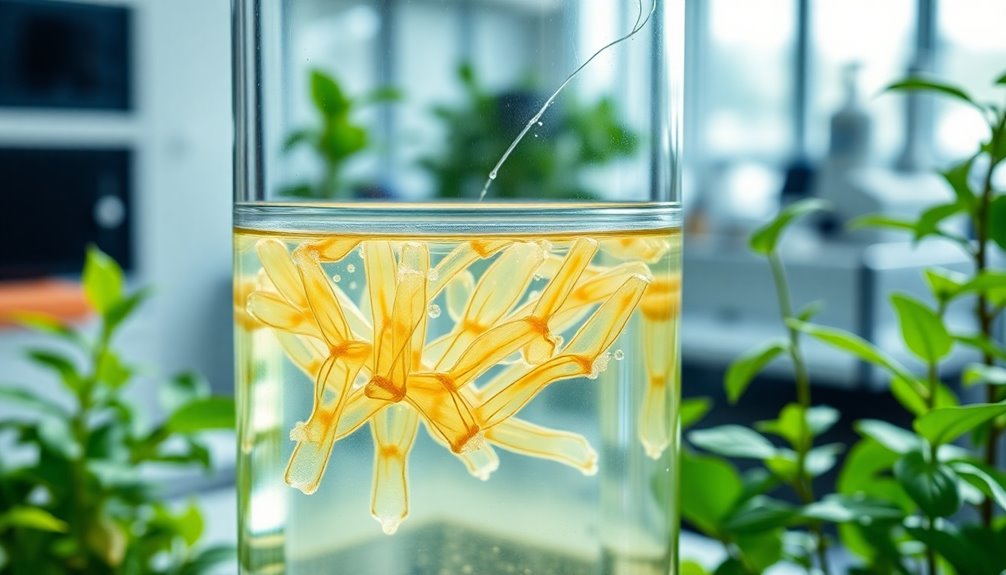Make sustainable choices in collagen production by opting for environmentally friendly marine collagen products rather than bovine collagen. Marine collagen sourced responsibly helps mitigate overfishing and deforestation, reducing the industry's environmental impact. Choose brands prioritizing sustainability for natural resource preservation, ensuring a positive contribution to the environment. By selecting marine collagen over bovine options, you support practices with a lower carbon footprint and higher bioavailability. Prioritize eco-friendly packaging and local sourcing to further reduce environmental harm. Consider certifications like Marine Stewardship Council for responsible sourcing. Sustainable collagen choices benefit both your health and the planet.
Key Takeaways
- Opt for marine collagen for lower environmental impact and sustainable sourcing practices.
- Consider certifications like MSC and Certified Grass-Fed for responsible collagen production.
- Choose collagen products with eco-friendly packaging to reduce waste.
- Prioritize vegan collagen alternatives for cruelty-free and sustainable supplementation.
- Support brands with transparent sustainability initiatives for environmentally conscious choices.
Collagen Sourcing and Sustainability
When it comes to collagen sourcing and sustainability, making conscious choices can have a substantial impact on the environment. Opting for marine collagen products from environmentally sound collagen companies can play a significant role in reducing the environmental impact of collagen production. Sustainable sourcing practices, such as utilizing fish skin to create marine collagen and ensuring traceability in the sourcing process, help mitigate issues like overfishing and deforestation associated with collagen production. By supporting collagen companies that prioritize sustainable practices, you contribute to the preservation of natural resources and ecosystems.
It's essential to be aware of the environmental implications of collagen production, with bovine collagen often linked to Amazon deforestation. Choosing marine collagen products over bovine ones can be a more sustainable choice due to the reduced waste and the potential to support responsible fishery management.
Marine vs. Bovine Sourcing
Marine collagen and bovine collagen are two popular sources of collagen with distinct characteristics and environmental implications.
Marine collagen, sourced from fish skin and scales, boasts high bioavailability, ensuring effective absorption in your body.
On the other hand, bovine collagen, derived from cows' connective tissue, bones, and skin, is more cost-effective and rich in collagen types beneficial for your skin and bones.
When considering the environmental footprint, marine collagen production tends to have a lower carbon footprint, making it a more sustainable choice compared to bovine collagen.
Responsible sourcing practices are essential for both marine and bovine collagen to minimize their environmental impact.
By opting for collagen products sourced sustainably, you can make a positive impact on the environment while benefiting from their high bioavailability and unique properties.
Make informed choices that align with your values for a more sustainable future.
Sustainable Packaging and Transportation
Opt for sustainable collagen products that prioritize eco-friendly packaging and transportation methods to reduce environmental impact. When selecting collagen supplements, look for brands that use recyclable or biodegradable materials for packaging. These options help decrease waste and lower the overall environmental footprint of the product.
Transportation of collagen products can generate carbon emissions, so it's beneficial to choose brands that prioritize local sourcing and production to minimize transportation distances.
Eco-conscious collagen brands often take steps to offset transportation emissions by supporting sustainability initiatives. By opting for collagen products from companies that focus on sustainable practices, you contribute to efforts aimed at reducing environmental harm from packaging to transportation.
Making choices that align with eco-friendly packaging and transportation practices not only benefits the environment but also supports the overall sustainability goals of collagen companies. Prioritizing sustainability in packaging and transportation is a simple yet impactful way to make a positive difference in the environmental impact of collagen production.
Certifications for Sustainability
To ensure the sustainability of collagen products, you should prioritize searching for certifications such as Marine Stewardship Council (MSC) and Certified Grass-Fed. These certifications guarantee sustainable sourcing practices in the collagen industry.
When you see the MSC blue fish logo on a product, it indicates responsible marine collagen production from well-managed fisheries. Similarly, the Certified Grass-Fed certification guarantees ethical sourcing practices for bovine collagen.
By choosing products with these transparent certifications, you can be confident in supporting environmentally conscious practices within the collagen production process. Sustainability certifications play a vital role in verifying that the collagen you choose aligns with your values and contributes positively to the environment.
Vegan Collagen Alternatives
When exploring collagen substitutes, opting for plant-based options can provide a sustainable and cruelty-free choice for supporting collagen production without relying on animal-derived sources. Vegan collagen products use plant-based ingredients like Ceratiq and Hyabest to promote skin health without compromising on effectiveness. These alternatives come in various forms such as powders, gummies, and tablets, catering to different consumer preferences.
In the realm of vegan collagen alternatives, brands like Ritual and Moon Juice stand out for their emphasis on transparent sourcing and sustainability. By prioritizing traceability in ingredient selection, these products guarantee that consumers can make informed choices that align with their values.
Sustainability is at the core of vegan collagen production, offering an ethical and environmentally friendly option for those seeking to enhance their collagen levels.
Choosing vegan collagen alternatives not only benefits your skin health but also supports a more conscious approach to collagen supplementation. By embracing plant-based solutions, you can contribute to a more sustainable future while nourishing your body.
Environmental Impact of Collagen Production
The environmental impact of collagen production is an urgent concern in today's world, with detrimental effects stemming from sourcing collagen from animal-derived sources, particularly bovine sources linked to Amazon deforestation.
The collagen industry profits from collagen and leather derived from cow carcasses, contributing to environmental concerns. To address this, opting for sustainable collagen sourced from grass-fed cattle, like Genuine Health's Clean Collagen, promotes more eco-friendly practices in collagen production.
Companies like Essential Proteins have faced scrutiny for potential links to Amazon deforestation through their collagen supply chains. Legislation is lacking for collagen companies to trace and address their environmental impact, highlighting the need for more sustainable practices and waste reduction in the collagen industry.
Challenges for Environment-Conscious Consumers
Given the complexities surrounding collagen production's environmental impact, environment-conscious consumers face significant challenges in exploring the market for sustainable options. Verifying the sustainability and environmental impact of products can be overwhelming, requiring thorough research and reliance on certification labels.
For eco-conscious consumers, the quality of collagen supplements lies in the sourcing and manufacturing practices. Companies may put forth sustainability claims, necessitating consumer diligence to uncover the truth behind them. Environmental consciousness demands careful product selection and awareness of sustainability practices within the collagen industry.
To navigate these challenges, you must prioritize understanding the environmental implications of collagen production, seek out transparent companies with ethical sourcing practices, and educate yourself on certification labels. By being proactive and informed, you can make choices aligned with your values while contributing to a more sustainable future.
Future of Ingestible Beauty
With a focus on integrity, transparency, and traceability, the future of ingestible beauty products is marked by innovative brands prioritizing sustainable sourcing practices. Brands are recognizing the importance of environmentally responsible choices when it comes to collagen supplements and other ingestible beauty products. Sustainable sourcing is becoming a central tenet for these brands, responding to the increasing demand from consumers for eco-conscious options.
The shift towards sustainable practices isn't just a trend but a necessary evolution in the beauty industry to promote environmental responsibility. Collaboration between brands, experts, and consumers is essential in shaping this sustainable future. By ensuring that ingredients are ethically sourced and production processes are environmentally friendly, these brands are setting a new standard for ingestible beauty products.
Transparency in the sourcing and manufacturing of these products will provide consumers with the confidence that they're making sustainable choices for both their beauty regimen and the planet.
Sustainable Marine Collagen Practices
Considering the push towards sustainability in the beauty industry, a significant focus has shifted towards embracing sustainable marine collagen practices. Marine collagen, sourced from fish skin and scales, reduces waste in the fishing industry. Sustainable extraction methods yield over 50% collagen content from fish discards like skin and bones, promoting responsible sourcing and lower environmental impact.
By sourcing from well-managed fisheries, marine collagen supports marine biodiversity conservation and offers an eco-friendly alternative with a lower carbon footprint compared to bovine collagen production. Opting for marine collagen from sustainable sources not only reduces waste but also upholds ethical practices and contributes to the health of marine ecosystems.
Embracing these practices not only benefits your skin but also aligns with your values of sustainability and responsible consumption. Make a conscious choice for your beauty routine by opting for marine collagen from eco-friendly and responsibly sourced origins.
Ethical Costs of Collagen Production
Although the beauty industry often emphasizes the benefits of collagen, it's essential to acknowledge the ethical costs associated with its production. Collagen production, particularly from bovine sources, has been linked to Amazon deforestation driven by cattle ranching practices. Companies in the collagen industry profit from cow carcasses for both collagen and leather, contributing to deforestation. Essential Proteins and other collagen companies have been associated with deforestation-linked practices, raising concerns about the displacement of Indigenous communities due to cattle ranching for collagen production.
Despite its implications, collagen's environmental impact, especially concerning deforestation, has largely escaped scrutiny. When choosing collagen products, it's critical to ponder the ethical implications of supporting practices that harm the environment and communities. Making informed choices can help mitigate the ethical costs associated with collagen production and contribute to a more sustainable future for both the beauty industry and the planet.
Frequently Asked Questions
What Are Sustainable Sources of Collagen?
For sustainable collagen, choose from marine life, bovine, or vegan options. Opt for marine collagen for high bioavailability and lower impact. Pick responsibly sourced products with certifications like MSC or Certified Grass-Fed to support environmental conservation.
Is There Any Evidence That Collagen Supplements Work?
Sure, there's evidence supporting the benefits of collagen supplements for skin and joint health. However, some studies may have industry bias. Consider a balanced approach by incorporating amino acid-rich foods for natural collagen production alongside supplements.
Is Bovine Collagen Sustainable?
Yes, bovine collagen isn't entirely sustainable due to links with Amazon deforestation. Opt for grass-fed, pasture-raised sources to reduce environmental impact. Make informed choices to align with your values and mitigate harm.
Is Vital Protein Collagen Ethical?
You should question the ethics behind Crucial Proteins' collagen production. Deforestation linked to cattle ranching raises concerns about the company's practices. Make informed choices to support ethical and sustainable collagen sourcing for a better future.
Conclusion
To sum up, when choosing collagen products, opt for sustainable sourcing, eco-friendly packaging, and vegan alternatives to minimize environmental impact. Consider certifications for reassurance and support companies practicing ethical collagen production. As a consumer, your choices can make a difference in preserving our planet for future generations. Make informed decisions and prioritize sustainability in your skincare routine for a healthier planet and a healthier you.


